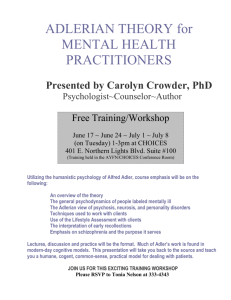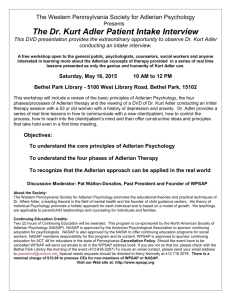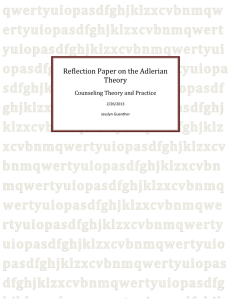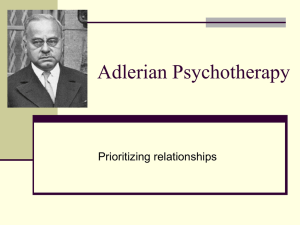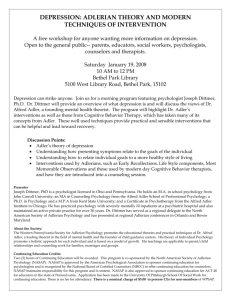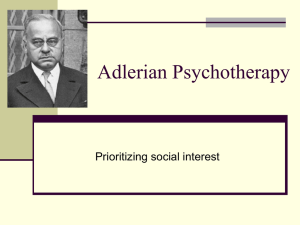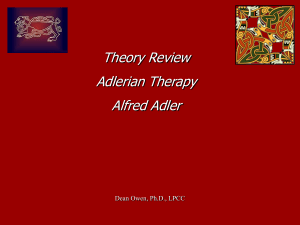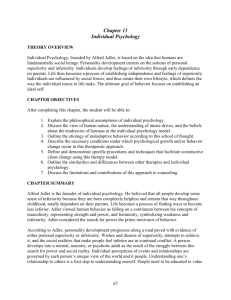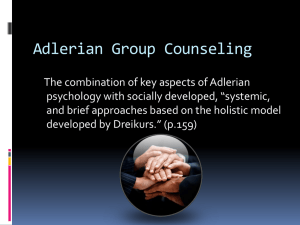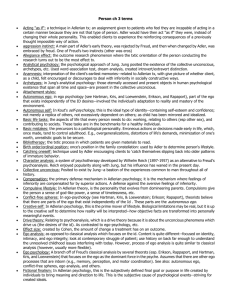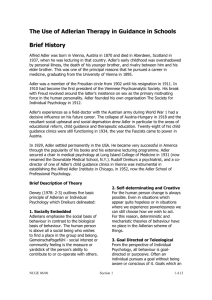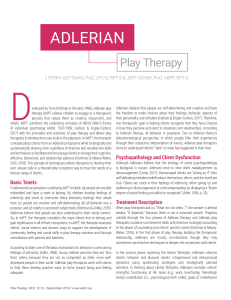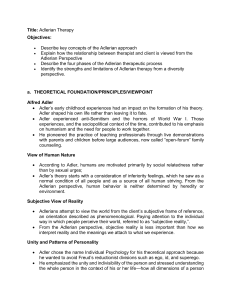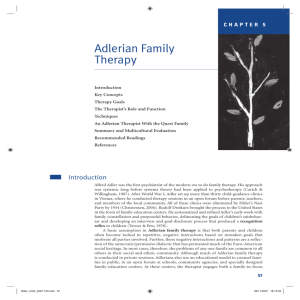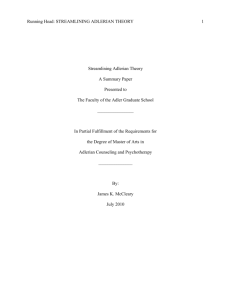Chapter 3 Individual Psychology and Adlerian Therapy Glossary of
advertisement
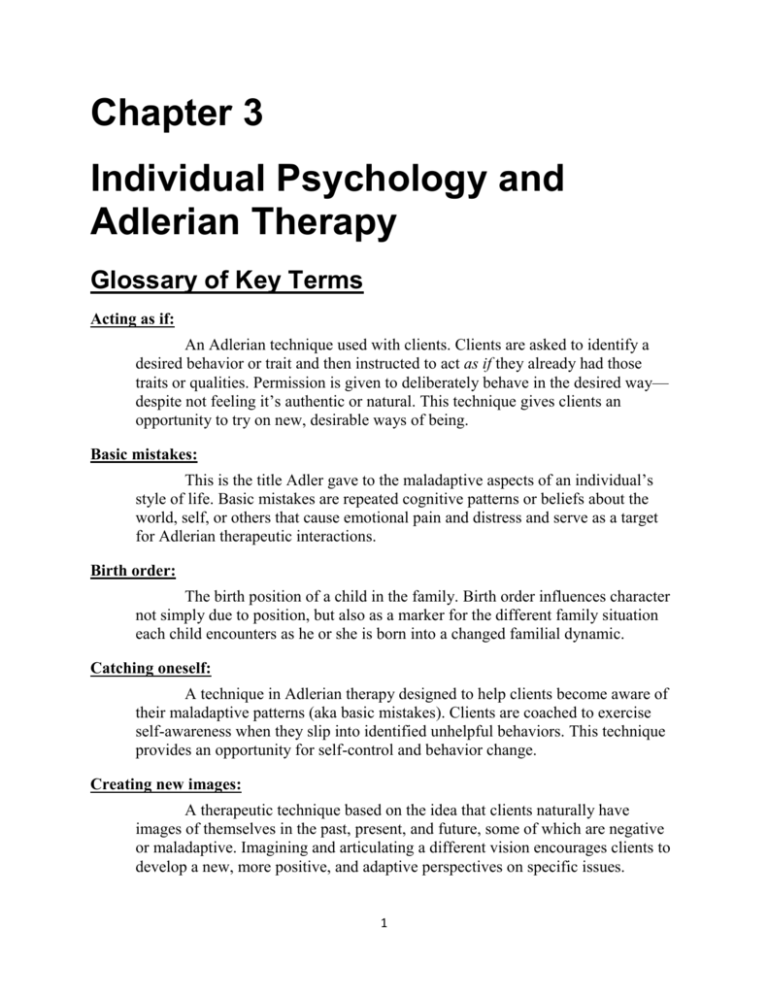
Chapter 3 Individual Psychology and Adlerian Therapy Glossary of Key Terms Acting as if: An Adlerian technique used with clients. Clients are asked to identify a desired behavior or trait and then instructed to act as if they already had those traits or qualities. Permission is given to deliberately behave in the desired way— despite not feeling it’s authentic or natural. This technique gives clients an opportunity to try on new, desirable ways of being. Basic mistakes: This is the title Adler gave to the maladaptive aspects of an individual’s style of life. Basic mistakes are repeated cognitive patterns or beliefs about the world, self, or others that cause emotional pain and distress and serve as a target for Adlerian therapeutic interactions. Birth order: The birth position of a child in the family. Birth order influences character not simply due to position, but also as a marker for the different family situation each child encounters as he or she is born into a changed familial dynamic. Catching oneself: A technique in Adlerian therapy designed to help clients become aware of their maladaptive patterns (aka basic mistakes). Clients are coached to exercise self-awareness when they slip into identified unhelpful behaviors. This technique provides an opportunity for self-control and behavior change. Creating new images: A therapeutic technique based on the idea that clients naturally have images of themselves in the past, present, and future, some of which are negative or maladaptive. Imagining and articulating a different vision encourages clients to develop a new, more positive, and adaptive perspectives on specific issues. 1 Discouragement: An attitude or belief that develops as a result of ongoing or profound feelings of frustration or inferiority. Discouragement is the Adlerian root of psychopathology. This is sometimes referred to as having a lack of courage to face the Adlerian life tasks. Early recollections: Memories of childhood used to understand a client’s thoughts, feelings, and attitudes toward him- or herself and life. Adler believed early recollections were powerful tools for understanding client lifestyle (or guiding self-ideal). Early recollections are used as a projective tool to reveal the client’s current values and focus. Encouragement: For Adler, encouragement is a key to psychotherapy, psychological health, and well-being. Encouragement is a process where therapists (or others) focus on an individual in ways that build the person’s confidence and feelings of being worthwhile. It can include therapists showing interest and faith in the client’s positive qualities and potential. Family constellation interview: An interview approach for obtaining pertinent information about the client’s childhood experiences. Topics covered include descriptions of each family member, descriptions of how family members interact with one another, how each family member was viewed by the client, who fought, who didn’t fight, and much more. Fictional finalism: A term coined by Adler that referred to the endpoint of one’s purposeful striving, a goal or future-oriented concept that influences an individual’s present behavior and is defined by personal beliefs rather than objective fact. Adler stopped using the term “fictional,” (Also called fictional goals) later in his career instead using “guided self-ideal” to reflect the individual nature of one’s belief about a desirable future. Four goals of misbehavior: Rudolph Dreikurs’s application of Adler’s concept of purposeful striving applied to explain children’s misbehavior. Dreikurs’s four goals of misbehavior include: (1) attention, (2) power or control, (3) revenge, or (4) inadequacy. Children who feel useful and as if they belong in a social group are less likely to seek these less desirable behavioral goals. 2 Future autobiography: An Adlerian technique used to help clients become more intentional in shaping their future. Based on the belief that hopes for or beliefs about the future guide and shape everyday life, this technique involves having clients tell their life story from the present forward, understand how the nature of their story may be helpful or harmful to them currently, and perhaps guide them in shaping a more constructive or adaptive version. Gemeinschaftsgefühl: The German word meaning social interest or community spirit, and a concept central to the goals of individual psychotherapy. Well-developed social interest is viewed as a component of psychological health, enhancing ones capacity for empathy and altruism. Research has shown Gemeinschaftsgefühl to be positively related to spirituality, positive psychology, and human attachment. Goal alignment: A therapeutic approach in which the therapist and client match their desired outcomes for therapy. Although goal alignment is embraced by Adlerian therapists, the types of goals deemed appropriate are those that address basic Adlerian theoretical underpinnings such as community feeling, overcoming inferiority or discouragement, and addressing lifestyle and basic mistakes. Guiding self-ideal: The term used by Adler at the end of his career to replace “fictional goals” and “fictional finalism.” All these terms refer to the endpoint of one’s purposeful striving, a goal or future-oriented concept that influences an individual’s present behavior and is defined by personal beliefs rather than objective fact. Holism: An underlying assumption of Adlerian theory that defines humans not as separate parts (such as mind and body or id-ego-superego)—but as a single, complete unit that cannot and should not be divided into separate parts. Idiographic approach: An approach to research or therapy consistent with the Adlerian emphasis on the single, unique, whole individual. In contrast to general or nomothetic information, an idiographic approach values the information gathered from individual clients. 3 I’ll betcha: An advice-giving technique described by Corsini to turn the tables on a client who is resistant to the idea that a suggested course of action will have a desired outcome. When the client expresses doubts about the action suggested by the therapist, the therapist wagers the client to try the action and report back as to its outcome. Individual psychology: Individual psychology is the name given to Adler’s theory of psychotherapy. It reflects his core belief in the psychology of the single, unique, whole individual. Individuum: Latin for indivisible. This term reflects Adler’s choice to name his approach Individual psychology and emphasize holism in contrast to Freud’s reductionist models. Inferiority complexes: These are behavioral manifestations of inferiority feelings and can be deemed normal or pathological depending upon the degree of impairment they cause. Inferiority feelings: An individual’s subjective experience of being less than others or inadequate despite evidence to the contrary and that remain contained as an emotional experience and not acted on. Lifestyle (aka style of life): An individual’s subjective, created, and both conscious and unconscious cognitive schema of how the world works. Lifestyle is influenced by one’s circumstances, experiences, and biology. A core feature of Adlerian therapy is the exploration, definition, and reorientation of an individual’s internalized model of themselves and the world, or lifestyle, to better accomplish the tasks of life. Lifestyle assessment: The gathering of information about a client’s cognitive schema as his or her internalized model of him- or herself and how the world works. Modern approaches to lifestyle assessment often involve self-report questionnaires, but the three main assessment strategies are conducted using a clinical interview format that involves the family constellation interview, the question, and earliest recollections. 4 Masculine protest: An idea articulated by Adler in a paper of the same title in 1911. It explained specific gendered behaviors as responses to cultural coercion and socialization. This was in direct conflict with the biological and psychological factors emphasized in Freud’s theories. Adler’s theory explained women who behaved like men as responding to the oppression of women, excessively passive or aggressive behavior in men as a response to society’s overvaluing of masculinity, and men who dressed or acted like girls or women as protesting society’s specific definition of a masculine ideal. Objective inferiority: A measureable degree of being inadequate, lower, or less than in size, rank, quality, degree or estimation independent of subjective experience or belief. Paradoxical strategies: A strategy wherein the therapist prescribes the clients symptom or suggests that the client engage in more of the behavior or pattern that is troubling. Phenomenology: An existentialist concept that is also a core concept of individual psychology. Phenomenology emphasizes that individual experience is subjective and based upon one’s perception. Push-button technique: A therapeutic technique described by Mosak based on the Adlerian assumption that under every feeling there is cognition. It helps clients to learn how their thoughts influence their emotions by having them deliberately think of happy and sad memories The ability to think a positive thought then becomes a tool, or push-button, for clients to use to trigger the desired happy feelings. The question: An essential component of Adlerian therapy and the lifestyle assessment that asks “How would your life be different if you were well?” It can be phrased in many ways (e.g., “What would you be doing in your life if you no longer had your symptoms?”).The question is a straightforward method for determining if the client is obtaining special treatment or secondary gain for having problems and helpful in determining which life tasks a client’s symptoms may be helping him or her avoid. 5 Reflecting as if: A three-phase therapeutic procedure created by Watts via an integration of the classical Adlerian acting as if technique and a social constructionist perspective. The three phases entail asking the client to reflect on how they wish they would act differently, planning a hierarchy of specific behaviors linked to the ideal behavior or outcome, and implementing one or two of the easiest idealassociated behaviors in the client’s own life. This technique asks clients to step back and think about their behavior and ideals prior to acting as if, and by implementing the easiest changes first, increases the chances that the intervention will build an encouraging platform of self-efficacy for the client’s behavior changes. Reorientation: The fourth of the four overlapping Adlerian therapy stages. This stage involves new learning designed to change one’s lifestyle to better meet the tasks of life. Social interest: Community feeling or spirit, an important motivating factor and sign of mental health. Fostering this feeling and motivation is a primary goal of Adlerian therapy. See Gemeinschaftsgefühl. Soft determinism: A theoretical principle of individual psychology that falls ideologically between cause and effecting thinking and theories that dismiss causality entirely. Soft determinism suggests that all behaviors are multidetermined or caused by more than one factor. Spitting in the soup: A metaphor and therapeutic technique for spoiling a client’s use of a maladaptive strategy for addressing life tasks. This technique is used to point out the costs of a particular behavior pattern, therefore spoiling the easy use of it in the future. Striving for superiority: This is Adler’s most basic human motive. It is defined as the internal motivation for a perceived plus in one’s self and life. Striving for superiority can, depending on the individual, take on a pathological quality of pure self-interest or a healthier quality consistent with Gemeinschaftsgefühl, in which the push is to overcome one’s deficiencies and complete or perfect oneself with an attitude of social interest. 6 Tasks of life: Adler’s description of the demands the world places on an individual. Therapy is nearly always a result of thwarted attempts to respond to one of these demands. The goal of therapy is for the client to make the necessary adjustments to successfully rise to these challenges. Adler’s original theory divided the tasks of life into three areas: work or occupation, social relationships, and love and marriage. Dreikurs and Mosak expanded the tasks to include self and spirituality. Later, Dinkmeyer and Sperry added parenting and family as a sixth life task. 7
